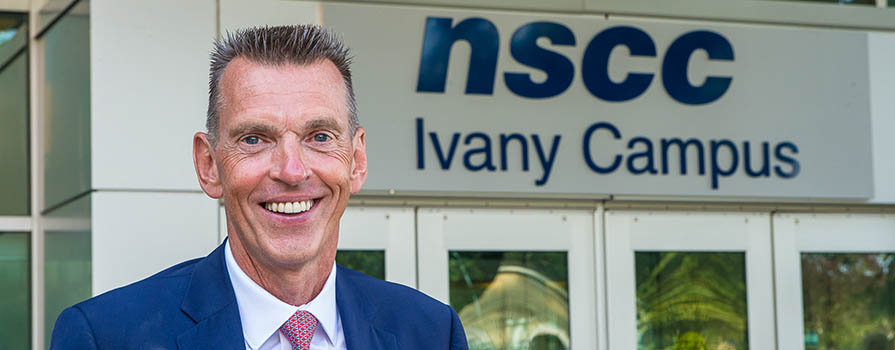Waterfront Campus renamed

“The Nova Scotia we’re all trying to create will have a more vibrant start-up community and NSCC will be at the centre of that – from one end of the province to the other.” – Ray Ivany
Determination and the passion to improve the economic and social wellbeing of Nova Scotia were the motivating forces behind former NSCC President Ray Ivany, who led the charge to secure the $123-million-investment in Nova Scotia Community College from the provincial government in 2003.
At a ceremony on August 22, 2017, the College found a way to say thank you to Ivany for his dedication and commitment by renaming its flagship metro campus The Raymond E. Ivany Campus.
The former president says it took many people with a shared vision to make the development of the College possible. He thanked staff at NSCC who played a part, and made a special mention of the vision of former Premier John Hamm and his colleagues for making the significant investment, as well as the work of the government of former Premier John Savage that set the stage for growth.
“In the late 90’s, Nova Scotia was experiencing an economic uptick across virtually every sector,” says Ivany. “All of a sudden, Nova Scotia started to see, almost paradoxically, high rates of unemployment and skills shortages.”
According to Ivany, a “made-in-Nova Scotia solution” – the Nova Scotia Community College – was the answer to that challenge. At the time of the funding announcement, Hamm noted the College had a ‘critical role in preparing that job-ready workforce.’ He described the important initiative as “the single, largest investment that government has made.”
The investment wasn’t about the bricks and mortar, it was about making the province a better place.
The driving force of Ray Ivany
During his tenure as president of NSCC from 1998 to 2005, Ivany led the College’s significant development and growth. Through his vision and direction, NSCC launched its first strategic plan and, in partnership with the government and growing local industries, aligned the educational needs of Nova Scotians with the demands of the labour market. He helped increase access to adult learning programs and improved student supports, including disability services.
The 2003 investment helped place NSCC at the forefront of post-secondary options in Nova Scotia and allowed significant growth in enrolment, program development and modernization of infrastructure that included the construction of the flagship Waterfront Campus in Dartmouth. The site is now LEED certified and features the Centre for the Built Environment, research facilities, and a diverse offering of programs.
NSCC President Don Bureaux says, “Ray’s conviction and passion spoke to government of the importance of such an investment – and of the guarantee of the return on that investment – for government, our economy, our people and communities and for the future of Nova Scotia.”
“The dualities of blending and balancing an economic imperative and a social imperative are rooted in Ray’s DNA and, because of his leadership, are now rooted in our DNA.”
A lasting legacy
Ivany Campus Student Association President Akash Pandey says, “The legacy of Ray Ivany’s vision is contained within these walls and extends to each student that passes through the campus and leaves with a heightened sense of purpose and self-worth.”
Labour and Advanced Education Minister Labi Kousoulis agrees. “NSCC is a place where youth are inspired to innovate, to take chances, and be creative. These are all characteristics that Ray embodies. His determination and drive continue to inspire every student who attends the College.”
Ivany says, “The gesture by the College is an absolute honour. I want everyone to know that it will mean a great deal to me, not only today but every day hereafter, to have this permanent connection with NSCC.”
Ivany, who led the One Nova Scotia Commission adds, “The investment wasn’t about the bricks and mortar, it was about making the province a better place.”
Fast Fact
Ray Ivany’s contributions to Nova Scotia’s post-secondary education sector include his role as executive vice president of the University College of Cape Breton and eight years as president and vice-chancellor of Acadia University. He retired from his role at Acadia in June 2017.

